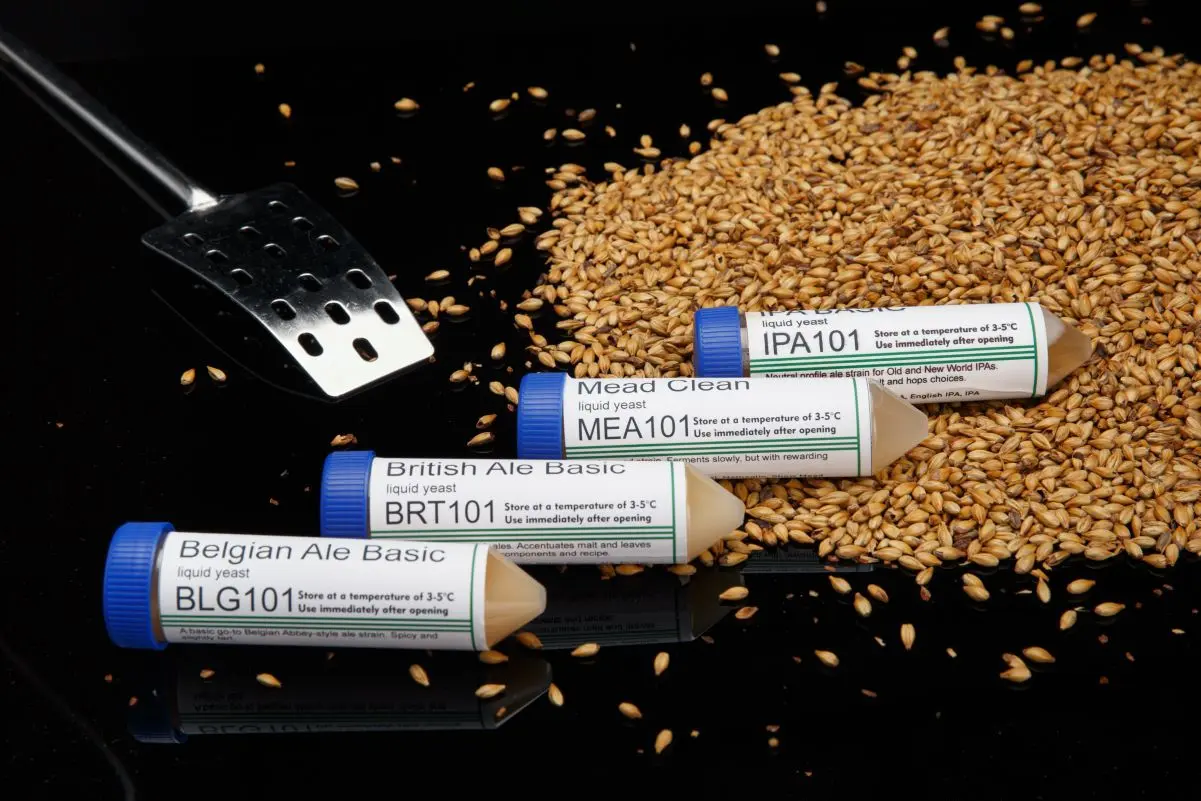I've been doing homebrewing together with my wife for quite some time, and at some point we started collecting a yeast library. There was a point in my life where we had an opportunity to start a company that does something we enjoy; we've tried starting an analytic lab for microbreweries (as we are both actually doctors in chemistry), but it didn't take off at all due to lack of demand (and COVID breakout), we had to switch to doing whatever brings cash (of course IT stuff it was, mostly, I feel ashamed).
But yeast library kept growing. We've decided to give it another try, got permissions from the Big Brother, and rolled out a small production!
We've deployed a webshop at https://store.zymologia.fi/ , there is other stuff that's kind of a byproducts of whatever other things we've had to do to get along (some of it was and is fun after all). The idea is that I don't think it makes sense to scale it up any further, we just have proper but minimalist equipment to do sterile pure culture cultivation, not large tanks, only glass that could be properly washed and autoclaved, and full-grain growth media because I hate smell of extract (and proper preparation of wort is about as difficult as getting extract clear enough for yeast making). Anyway, it's an actual commercial operation, I'm curious to see how far we can go with such attitude and whether it would become profitable or just another "make the world a bit happier place".
Most of yeast on sale is listed as "not available" which means we'll just have to wake them up, feed them up to speed, and package, which takes up to 2 weeks, which is less than beer recipe planning and preparation phase, at least for me. I don't think keeping an inventory with live yeast is a good idea anyway - many times I've had sad starved liquid yeast fished out of fridges in stores only to see lags on 30+ hours. That's also why I'm reluctant to go to resalers, though I might try it.
What I really think should be happening is yeast exchange. I don't want to keep things any more commercial than the general Finnish anti-soviet spirit tells me, so let me propose this idea: yeast growth takes time and effort, but sharing is caring - I'd be happy to share a swab of yeast culture with anyone who comes to our place (just tell me when, of course most of the time there is only yeast in the lab) with their own sterile slant carrier - I won't be shipping these, for I'm absolutely certain delivery services will mess it up, and also I (or whoever would be hanging around at that time) won't get to have a chat with you. (Please do this if you know what you are doing though, storing culture and scaling it to a starter is a bit more complicated than just making a starter, mistakes multiply badly with exponential growth and it's not very feasible to propagate without going through single-cell plating or something similar. If you don't know what that means, learn it first, or it's worth just buying a ready liquid yeast, the great purpose of sharing culture material is to let other people have it in their library, which would require you to go through single-cell propagation at least a few times a year).
We also have an opensource (all we do is opensource, I believe in the idea) piece of software to keep yeast lineage in check here: https://github.com/Alzymologist/yeast It's a bit underdocumented at the moment to say the least, but it uses Bayesian inference to analyze yeast parameters and catch mutations, and it was able to detect deviations before we've tasted the outliers blindly, I think it's quite cool too. I don't think anybody did this before.
Sorry for self-advertisement, I've asked moders if this sort of thing is OK here before posting. I hope this is interesting enough to be worth being here.

Given your proximity to Kveik and other farmhouse strains, it would be cool to focus on the preservation of them. Kveik in particular is very easy to store and ship because it survives desiccation well. It would be very interesting to figure out which genes are responsible for desiccation hardiness, and put them into other strains. There’s a lab in California specializing in GMO brewing yeast: https://berkeleyyeast.com/
That would be cool indeed! Would you suggest some particular brews we should chase?
One strategy to catch new strains is to give friends that go traveling a couple of plastic test tubes and ask them to save a drop of beer for us. We've got quite a lot of acetic and lactic bacteria this way, of course, but some yeasts too.
GMO yeast distribution has questionable legality here as far as I understand, but it doesn't mean it's illegal to make and study it. I've been looking for some projects to finally play with CRISPR and lyophilization chamber somebody at our lab was building for no particular purpose (we've bargained a sizeable set of used but surprisingly operational Edwards vacuum pumps at ebay, they itch to build something out of them).
Seriously, after seeing feedback here, I'm thinking about selling dry yeast as well, since it's not too much of an upgrade and we can build a stock just for the sake of spreading strains around the globe...
I would suggest contacting Lars Garshol, who has really changed the known world of farmhouse yeast. There may yet be some more to discover in Finland.